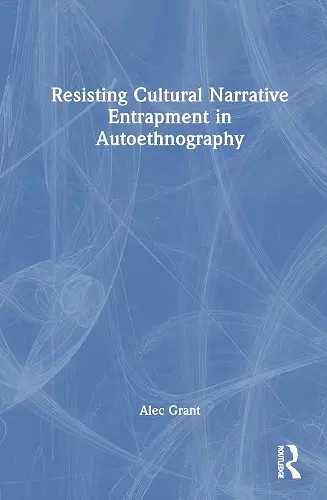Resisting Cultural Narrative Entrapment in Autoethnography
Format:Hardback
Publisher:Taylor & Francis Ltd
Published:18th Mar '25
£145.00
Supplier delay - available to order, but may take longer than usual.
This hardback is available in another edition too:
- Paperback£39.99(9781032855400)

Resisting Cultural Narrative Entrapment in Autoethnography delves into the nexus of cultural narratives and takes the reader on a journey through the intricate landscape of identity and cultural critique. Each chapter, enriched with dialogues with 'Ash,' our imaginary interlocutor, presents a profound exploration rooted in the philosophical fabric.
This book amplifies the discourse on ontological and epistemological reflections often overlooked in narrative autoethnography. Central to its narrative is the concept of cultural narrative entrapment, meticulously dissected to unveil its philosophical underpinnings. It focuses on probing inquiries, from the essence of resistance to cultural narrative entrapment to its pivotal role in shaping autoethnographic scholarship. Through meticulous textual 'archaeology' chapters unfold, excavating layers of literature to redefine cultural identity and narrative constructs, offering a meta-autoethnographic lens. The discourse evolves, addressing critiques and paradoxes, while inviting readers to engage with the complexities of perception, representation, and the paradoxes of emplotment. Culminating with an illuminating appendix summarising the author's extensive body of work, this book serves as a beacon for scholars and practitioners navigating the nuanced terrain of philosophical autoethnography.
This book transcends the boundaries of traditional scholarship, offering a compelling narrative that challenges conventions and ignites intellectual curiosity. It is an indispensable companion for those seeking to unravel the profound intersections of culture, identity, and philosophical inquiry.
'Resisting Cultural Narrative Entrapment in Autoethnography is an extraordinary book for several reasons, the common denominator of which is the horizon of the challenge. First, Alec Grant wisely and provocatively challenges the neoliberal Academy and all those who maintain its status quo, including what the author calls ‘the autoethnography-lite autoethnographers.’ These imitators of truly creative and meaningful thought in fact demonstrate both intellectual and moral weakness. The second dimension of the challenge concerns conventional conceptualizations. Grant masterfully exposes and tests ‘centripetal pressures’ by creating a new integrated vocabulary, which serves as a means of expressing invisible patterns of cultural behavior. In effect, he modifies philosophical, sociological, and other disciplinary concepts, admitting a Trojan horse, which forces the reader to question what seemed to him/her inviolable. The third area of the challenge concerns the authorial self, and comes down to generating the possibility of constantly questioning him-self by adopting a ‘trickster-carnivalesque’ position. It is thanks to the above that Grant is able to pursue a critical philosophical autoethnography, treated as an alternative to the ‘uncritical acceptance of the cultures’ that weakens our mental vigilance.'
Marcin Kafar, PhD,Assistant Professor, University of Lodz, Poland
'Should autoethnographers, and qualitative researchers in general, become complacent about how they conceptualise and go about their work, then the questions raised by Alec Grant in this book regarding the nature and impact of cultural narrative entrapment will challenge them to engage in a serious rethinking and reassessment. Certainly, the issues explored by Grant, and the way he courageously auto-critiques himself throughout the text, do not make for comfortable reading. They do, however, need to be addressed honestly and directly by those wishing to advance a social justice agenda by actively resisting this form of entrapment which can so often be oppressive, damaging, and life-limiting for both researchers and those whose lives they examine and write about.'
Andrew Sparkes, PhD, Professor, Leeds Beckett University, UK
ISBN: 9781032851457
Dimensions: unknown
Weight: 470g
132 pages